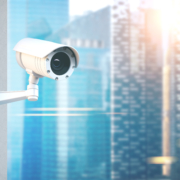DVR vs NVR (What’s the difference)
DVR and NVR are available options of security camera systems. Before setting up a video observation system you must choose between these two options. You must consider, price, installation, and which system will meet your requirements. In this article we’ll discuss DVR vs NVR, what’s the difference? In addition, we will explore how these systems work and how they can benefit your business.
What is a NVR camera system?
A network video recorder or NVR for short. An NVR is a computer system that records video footage directly from the network by Data cabling such as Cat5e or Cat6 with an RJ45 plug or module. The footage is then stored on a hard disk, cloud storage, or a mass storage device. The NVR system paired with digital internet protocol (IP) cameras. This is to create a video surveillance system. Lastly, there are two options of network video recorders. PoE NVRs, this uses ethernet ports to connect Poe cameras. The second option is Wi-Fi NVR’s, this allows connection to Wi-Fi IP cameras via wireless signal.
- HDMI and VGA ports to connect to the monitor
- LAN port that connects to the router and main network
- Outer ports to connect external hard drives
- Connect RJ45, Cat5e and Cat6 port PoE cameras
What is a DVR camera system?
A Digital Video Recorder or DVR for short is a legacy security camera system. DVR systems are used with analog cameras. These cameras can’t process the video footage, instead the cameras will stream raw video footage to the recorder via coaxial cables. Following this, the recorder processes the video footage. Once this process has been completed both DVR and NVR systems work the same. If connected to a viewing device such as a smartphone or laptop, you are able to easily access and view the video footage.
- Coaxial port for connecting analog camera or Cat5e cables with baluns
- HDMI and VGA ports to connect to the monitor
- LAN port that connects to the router and main network
- Outer ports to connect external hard drives
NVR system Pros & Cons
| Pros | Cons |
| IP Cameras are more robust | More expensive than DVR systems |
| More flexible system | Some software is not user friendly |
| Cameras have multiple lenses (better coverage) | |
| Wired or Wireless | |
| PoE (only need 1 cable) | |
| Cloud Storage |
DVR System Pros & Cons
| Pros | Cons |
| User friendly. Easier to operate & set up | Unable to record audio |
| Cheaper than NVR system | Requires a separate power source |
| New technology is improving the image quality for systems used with HD over Coaxial. | Uses more cables and wires which can make the installation difficult |
| Less coverage in comparison to IP cameras | |
| Lower frame and image quality compared to NVR |
Which is Better DVR vs NVR?
Both DVR and NVR record video footage on a disk drive. The main differences lie in their implementation and design, additionally how they process raw video data. When choosing a system for your business, you must review your needs and flexibility. While DVR systems are considered to be the older ‘legacy’ option, they are still in use. However, the technology advancement of DVR system may be capped at a lower level than NVR systems. NVR system have the technological advantage because of the cables used to connect them and because they use the internet. The system you choose highly depends on you needs and budget. To guide you in your decision, below is a list of things to consider.
- What cabling do you currently have? Are you ready to change it all?
- Do you have in place programming network switches and tools?
- How much maintenance and usability is required?
- Who needs access, is remote access crucial?
- How much storage space do you need?





